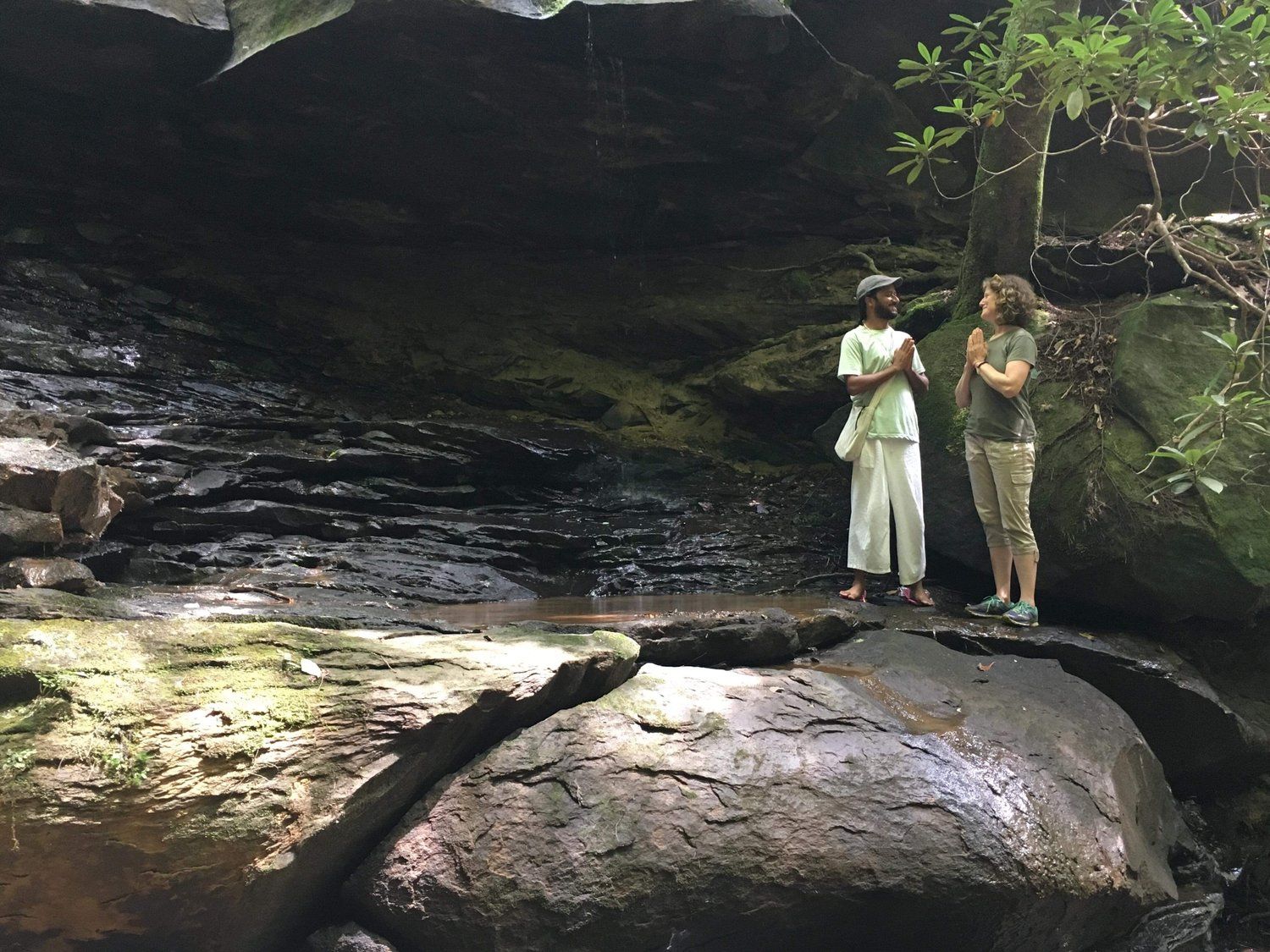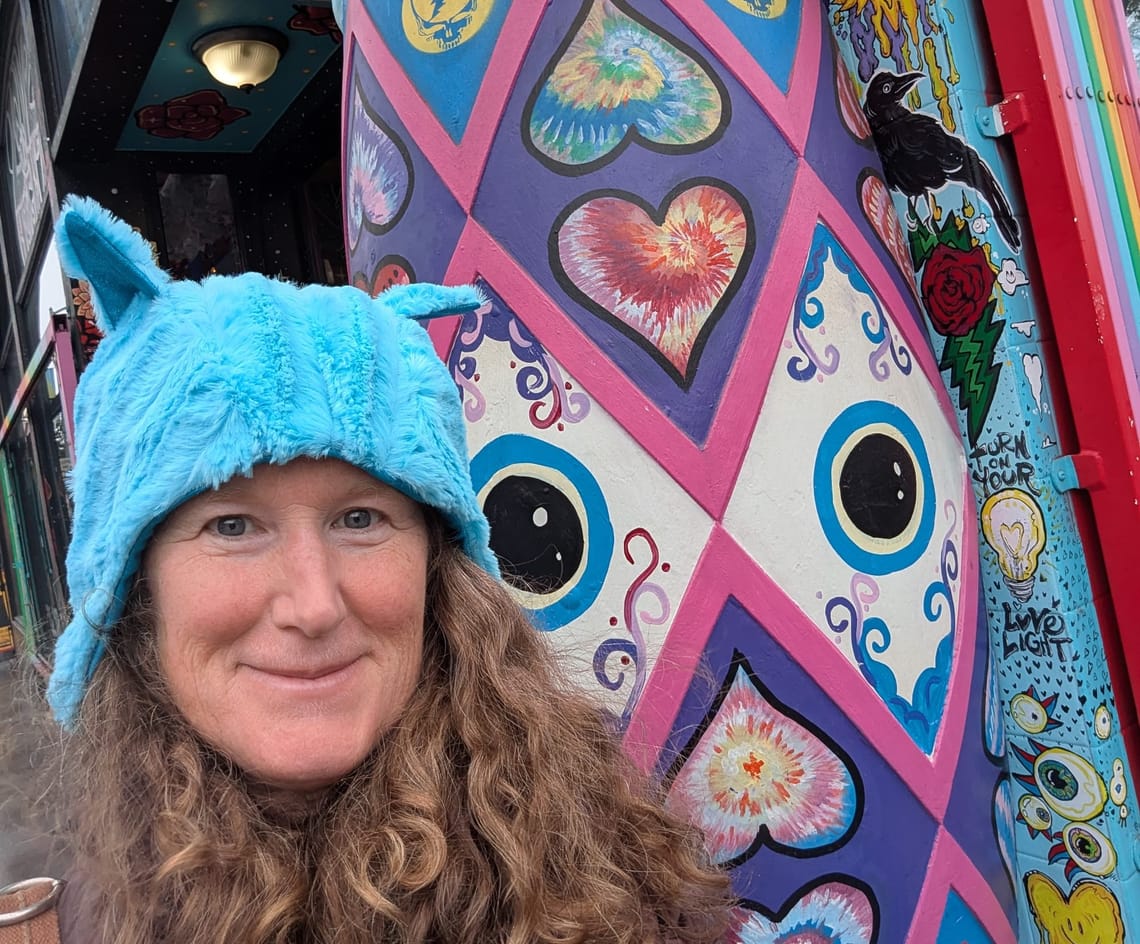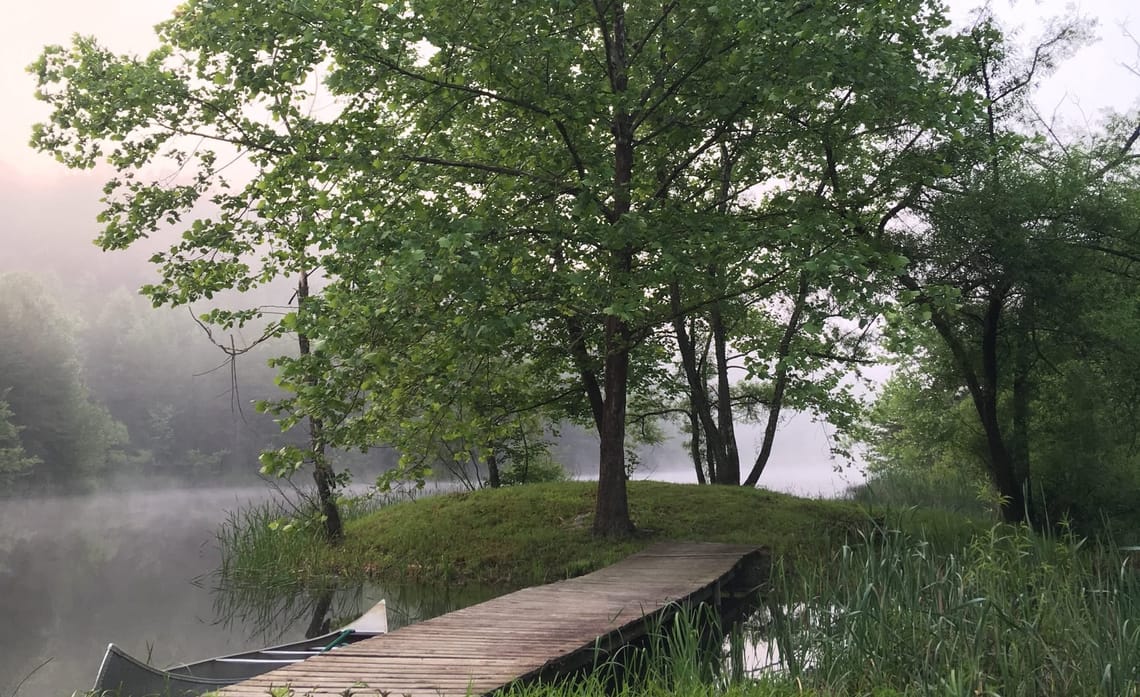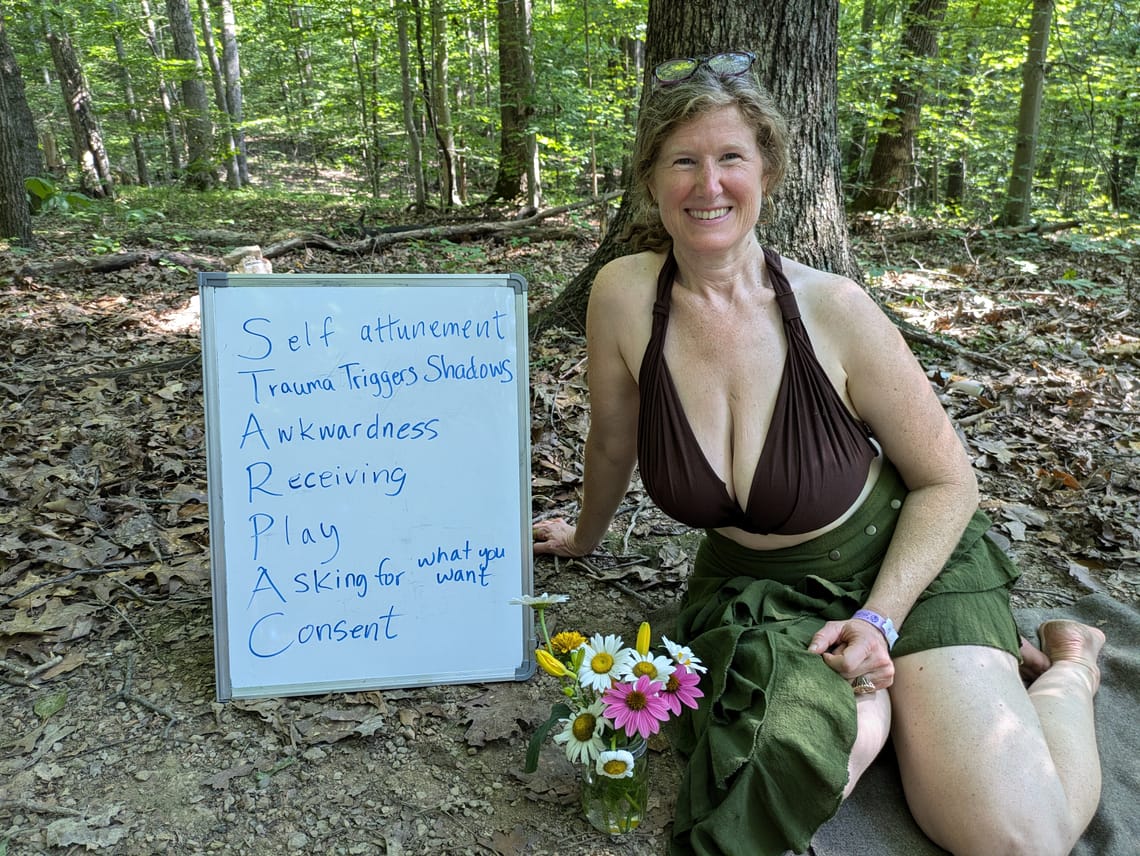Jul 31 2018
It’s Tuesday July 31, the last day of the three months of this Pop Up Play Ashram here in the Red River Gorge. For the past 92 days, we have committed to daily morning yoga and meditation practice, evening fire puja, shared vegetarian (mostly vegan, sattvic) meals with mealtime mantra, embodying yogic principles and values, morning silence, mutual spiritual support, playfulness whenever possible, and clear compassionate communication. We have had more than 40 people participate in the ashram in some way... from meals, to yoga practice, fire ceremony, or attending our workshop on the gift economy or even the Cuddle Party at Whippoorwill. I am using this picture of me and Yogi Amitram as a way to thank Yogi for giving me a few of the missing pieces that I needed in order to bring this ashram from the heavenly realm of ideas and concepts into the earthly realm of “reality”.
What have I learned? How has this practice benefitted me spiritually? Has it benefited the people who have created this with me? I’m making a list of some of the lessons, the learning, the wisdom, the experience, the insights, the epiphanies that have come through. I could easily write more about each one. If you are curious enough to read this whole list, could you also comment here about which of these things you might like to hear more about? Which ones stand out the most to you, or pique your curiosity? I’m considering if this could be turned into a more lengthy writing project. I am also collecting pieces that others have written about their ashram experiences, because maybe it could be published as a collectively written piece at some point. So if this ashram project has touched you in some way, please feel free to write about it and send it to me!
1.
I learned that I value something that I am roughly calling “mental toughness” in a partner. I deeply respect this quality in other people and in myself. I learned this when my friend and founding partner decided to leave with still a month to go. This caused a big emotional upheaval for me, so I got to do a lot of digging around inwardly. Why do I value this quality of “mental toughness” so much? I have an ongoing question about this willingness to withstand discomfort and how it reconciles with also valuing self care and speaking up for what we need, and being willing to cash in or surrender or just fucking give up when things get tough. Why paddle upstream if we can float downstream all the time? I am pretty sure that spiritual work involves some courage and paddling upstream… or does it? How do we know when to stick with a practice in order to experience its deepest gifts, despite resistance and unpleasant feelings, and when to walk away and try something else? I have something that jumps to mind as an intuitive answer to this, but for now, I’m just leaving the question because it’s juicy.
2.
As a related epiphany, I also observed about myself this unrelenting coarseness, a “just get ‘er done” mentality that I bring into how I do so many things. I got to see this over and over again when I would watch how other people approached familiar tasks, such as prepping for fire ceremony or cooking a meal, and then also observing how I myself went about these things, and how it varied from day to day. Such a lack of patience on my part, always in a hurry, so often willing to compromise beauty or completeness or some “ideal”. I have yet to translate this glimpse into the deeper truth, the truth that lies underneath this my judgement of myself.
3.
I learned that I still have some (maybe big) work to do on this sense that I may be letting other people down. I feel like I spent these past three months with a constant sense of tension about time, like there were always people waiting on me. Whenever I went out to climb, I was aware that there were people back at the ashram who were not climbing, and I felt some sense of responsibility to them, and to this community that I had asked for and had created. This made it very hard to really ever relax during the day, or to really enjoy climbing in the same carefree way.
4.
I learned that having people come in and out is energetically taxing. And also super necessary.
5.
I learned that the hardest thing about living in a tent with electricity and even a bed in it, is dealing with the dampness and the moisture from the rain. Sleeping in damp bedding just is not as comforting as dry bedding. This is not even talking about the mold. That’s on the list, too… see #11 below.
6.
I learned that moving my stuff, even just from one tent to another, is disruptive and not something I really enjoy doing, like ever. Yes, I could reframe it as a practice, as an exercise in impermanence, but JEEEZ there is something to be said for GROUNDING too! And moving my shit around all the time is NOT FUCKING GROUNDING, OK?? 😂 You get the point, I hope.
7.
I learned that I am constantly wanting to approach climbing as a playful endeavor, an activity where the process is more important than any outcome or performance. Yet, because of this idea of “sending” a route, and the collective agreement that this is for some reason important, there is so often a sense of outcome in my mind. I have such a question about this… how to drink from the sweet cup of playfulness more often? While climbing? And, really, in life in general...
8.
I saw that the more I explained the significance of fire ceremony to people, the more comfortable I became with myself as a spiritual leader. I had so many opportunities to see my discomfort with praying in public, and I am happy to be letting that one go.
9.
I was overjoyed to learn, based on what several visitors shared, that what we created had what I will call the “ashram effect” on visitors, as well as of course on me. The “ashram effect” is this feeling of wholesomeness and calm that happens on a cellular level, that creates the conditions for healing, growth, learning, observation and transformation. There were certain phrases and things that people shared that led me to know that IT WORKED! That magical feeling that I got in India for the first time, we were able to create here as well! Huzzah! Big celebration!
10.
I learned that despite wanting to cultivate a sense of play, as an ally for learning, that I really needed others to bring that energy. I was able to welcome it when it showed up, and to feel so grateful for the fun conversations with A, C, O and B about inventing social awkwardness games, for C bringing art supplies, water toys and music, for K bringing endless curiosity, and for L, B and D for representing Peter Pan energy here in the climbing Never Never Land. Thank goodness for Peter Pan.
11.
I learned about mold and mildew as a spiritual teacher. Who knew? Mold is especially destabilizing because it draws our attention to the invisible, microbial realm in a visible way, reminding us that we are not actually in control of our world the way we might like to be. Mother Nature is still in charge! Mold destabilizes our sense of sanitation and health… two concepts that are deeeep in our programming. Our parents start programming us about these things as soon as we can move or talk (“Don’t put that in your mouth, it’s dirty,” we say to toddlers.) “Don’t live in that tent anymore! It’s making you sick,” said the voices in my head.
12.
I was again reminded that offering oneself as a “container” in which people can gather is a spiritual practice, a very valuable way to be of service to others and also has a certain cost energetically.
13.
I came to a deeper understanding and reverence for fire and its principles. There is a reason we honor it every night and give thanks for it. Feeling into its laws, respecting them, and feeding the fire according to them, is a surefire (ha! Pun!) way to cultivate presence and awe, and some deeper things that would take an essay (or more) for me to explain.
14.
Self care is extremely important when it comes to creating this ashram experience, and extremely challenging, due to some of the limiting beliefs and challenges that I have outlined above.
15.
I have a deep ongoing question about this idea that “the circle is the teacher”. This ashram was specifically founded WITHOUT a guru, because I have a guru allergy (long story there) and because one of my teachers, Chameli Ardaugh, has said that she thinks that we as evolving humans, need a new model, outside of the guru/student model, where the circle is the teacher. So, that being said, how do we create the conditions for the circle to teach? Does it just happen naturally due to rubbing up against one another and living in community? What skills as facilitators do we need in order to enable this particular kind of learning? We may not be gurus, but we do need to be skilled, conscious, aware, available and allowing of this learning/teaching model. Bill Pfeiffer, among others, is a master at this.
16.
Another abiding question: Climbing as a teacher, or as a portal for self knowledge. This has been a path for me for so long, and I am just now getting into how to share this portal with others. How to share it? Under what conditions? Sharing it with new climbers is very different than sharing it with more experienced climbers. And this is one I get prickly about. I don’t want to teach people how to belay or how to do the basics; I find that very tedious. However, give me a group of experienced climbers and let’s talk about the heart and soul of our climbing, and I’d do that for days.
OK! So I think I’ll leave it at these 16 lessons for now. Seems appropriate… 16 corresponds to the number of primary Odu or sacred divination patterns in Ifa, the Yoruba spiritual tradition from Nigeria West Africa (I practiced as a Yoruba priestess for 10 years). These sacred patterns are deities in and of themselves. This number feels right because it corresponds to an infinite amount of wisdom that I feel can be gained from continuing this lifestyle and this line of self-inquiry. Thank you for reading and I really would value and appreciate your comments and feedback. Hari Om!



